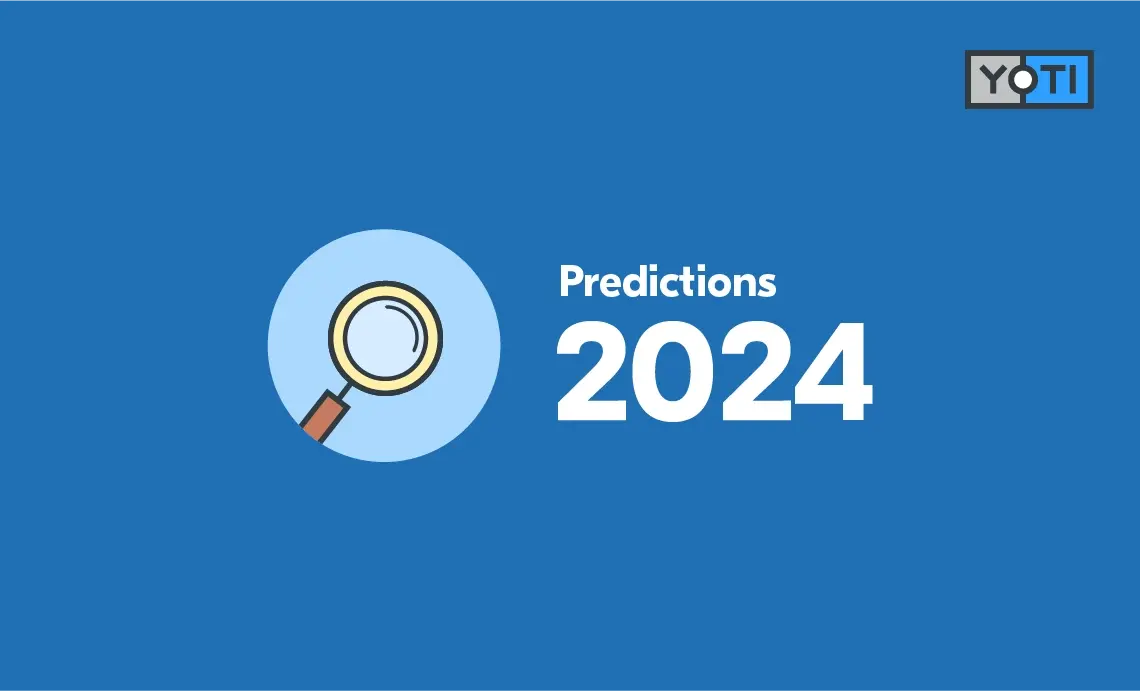
As we get our heads back into work after the festive break, our team has shared their predictions for 2024.
The threat from deepfakes will accelerate
In 2023, the threat of AI generated deepfakes continued to make the headlines. Some celebrities and well-known public figures found a fake advert of them promoting special offers or investments. News stories reported scammers using AI to mimic the voice of a loved one or to pretend to be someone from their bank. And technology was used to create AI-generated child sexual abuse images. With over 70 countries hosting general elections in 2024, deepfakes are likely to sway votes.
So far, the technology to create deepfakes – generative AI utilising deep neural networks – has been developed largely by researchers interested in pushing the capabilities of the technology. The goal has primarily been to generate images that are increasingly realistic to the human eye.
This year, we expect many companies will make bold claims that they can detect deepfakes. But the rate at which AI image generation is progressing means detecting deepfakes could be nearly impossible within a few years. Research has shown that some minor modifications to AI generated images can fool many of the deepfake detectors.
When it comes to biometric authentication, Yoti’s approach to detect deepfakes is two-fold:
- Yoti’s MyFace NIST Level 2 liveness technology – detects that the image being presented isn’t a display, mask or print attack
- Patented Secure Image Capture (SICAP) injection detection – ensures that the image received is really from a camera, and not an image or video injected into the flow as a fake camera stream
The above combination makes it extremely difficult to use a deepfake in the context of biometric authentication. The escalation of deepfakes will drive further advances in injection attack detection and greater demand for high quality liveness attack prevention. We will share more news on combating Generative AI and deepfakes in the next few months.
We will see more online safety regulation
In the UK, Ofcom will publish further consultations on the codes of practice for the Online Safety Act, following on from their recent published guidance around how to tackle illegal harms and guidance on age checking to prevent children from accessing pornographic content. We will continue to keep a close eye on how these consultations progress, along with similar online safety related codes and consultations being published by regulators in other countries, ensuring we are ready to help regulated companies comply.
In the UK, we should also see progress on the Data Protection and Digital Information Bill. This should reform the UK GDPR and set the legal foundation for the UK’s digital identity trust framework.
Last September we submitted our facial age estimation technology to the National Institute of Standards and Technology (NIST) for testing. We expect NIST to publish the results in the coming weeks, reporting on the accuracy and efficiencies of different vendors’ facial age estimation algorithms. We hope the results will give more businesses and regulators confidence that facial age estimation is a very effective way to protect minors online by checking that someone is above or below a certain age.
It’s noteworthy that facial age estimation is the only AI or machine-learning age assurance method that NIST is evaluating at this stage. Additionally, Ofcom has said they have not seen evidence that other age estimation methods are as mature as facial age estimation.
We’re also waiting to see if the recent legislation introduced in Europe, including the AI Act, Data Act and the Digital Services Act package, will have any influence on UK policy making. These are the first landmark pieces of data and technology legislation since the UK left the EU.
Yoti will release proprietary face matching software
After 5 years finessing our facial age estimation technology, in July 2023, our R&D team started work on developing our own 1:1 face matching technology. We will be submitting our model to NIST for independent testing (and results publication) around the end of January.
Currently Chinese, Japanese, South Korean and US facial recognition vendors dominate ownership of the top 100 models on the NIST leaderboard (which currently covers 547 models from over 300 vendors worldwide). We expect Yoti will soon be the only British company to rank highly on the NIST leaderboard.
Our ambition to be the world’s most trusted identity platform means it’s important we develop world class, proprietary 1:1 facial recognition. This will be an essential AI service alongside our leading facial age estimation and liveness technology.
There will be increasing levels of automation in identity verification
This year, we can also expect to see increasing levels of automation in identity verification. This will create more competition in the sector and put increasing pressure on prices and margins.
We continue to see strong evidence that the combination of world class automation AI, with the fallback of a highly skilled security team, offers the highest level of fraud detection, despite some ID companies claiming there’s no value added by human security experts.
Digital proof of age will be accepted in England and Wales for the sale of alcohol
It looks increasingly likely that the UK government will change the Mandatory Licensing Conditions before the end of 2024. This would allow people to use a digital proof of age when buying alcohol in supermarkets and hundreds of thousands of licensed premises in England and Wales. This follows the Home Office trials in the first half of 2022, when digital age verification was successfully tested at supermarket self-checkouts.
We’re excited for England and Wales to be able to accept digital age verification; offering people a more convenient way to prove their age. This is something many people are ready for; with 57% of GB adults willing to use a digital identity app on their phone to prove their age (YouGov, 2023).
Our Digital IDs already help millions of UK individuals legally prove their age across many sectors. But once the Mandatory Licensing Conditions change, millions of people in England and Wales will be able to prove their age in a simple, quick and secure way when buying alcohol.
There will be greater demand for Digital IDs
In 2023, nearly one million people in the UK downloaded one of our reusable Digital ID apps. The demand for and growth of Digital IDs will only increase as more services move online and the UK government introduces more legislation to support digital identities in the UK.
The upcoming Data Protection and Digital Information Bill aims to bring digital identity to more people by establishing the UK’s digital identity trust framework and introducing a digital identity regulator. This will build more trust and confidence in Digital IDs and fuel both higher adoption and business acceptance.
Predicting adoption rates of new technology is hard. But given how impactful reusable Digital IDs will be in the UK, the expected regulatory changes in the next five years and the recent introduction of Digital ID Connect, we expect to see growing demand for Digital IDs in the UK. We’ll share more country specific market analysis in our upcoming Digital ID white paper.
To keep up to date with Yoti news throughout 2024, follow us on LinkedIn.

